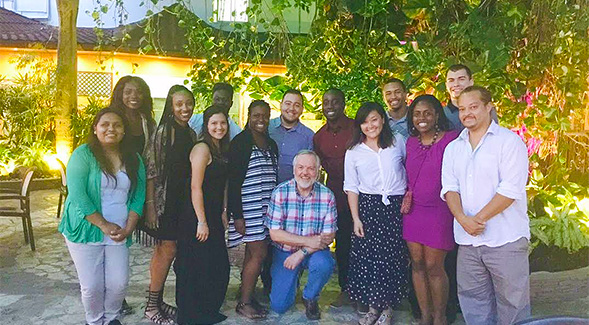Building Diverse Teams to Meet International Challenges
Howard Betts credits his success to friendship.

“Audacity helped me get to where I am, but my friendships and questions helped me find the path I wanted to take.”
In the early 1970s, Howard Betts, a sociology and linguistics student at San Diego State, worked with his friends to put together a rock and roll concert at Greek Bowl, now known as the Cal Coast Credit Union Open Air Theatre, with three days’ notice.
Fast forward a few decades.
Betts (’80) added leadership positions for the Department of State in Washington D.C., Guatemala, London and the Dominican Republic to his stellar resume. During his tenure with the Department of State, he worked on policy coordination for the United Nations Security Council negotiations on Afghanistan, Nepal, Bosnia, Kosovo, Haiti and Cuba. He received a Meritorious Honor Award for a creative initiative to promote Human Rights in Cuba, environmental reporting in Mexico and consular leadership in Pakistan.
How did he accomplish all this? Through establishing friendships.
“It’s all about making friends,” he said. “I’ve adopted the approach that people are pretty much friendly and I treat them as such. With friendships, you can organize a rock concert for a few thousand people, attack illegal immigration in Pakistan or help American citizens during a hurricane.”
As a consular officer representing the United States, Betts has worked with thousands of people around the world to solve problems, ranging from visa adjudication to identifying fraudulent passports to transporting people to safety. Through his experiences, Betts continued learning about the different ways in which the world works, but his sociological perspectives shed light on his greatest philosophy — to work with people.
Aztec for life
Betts credits Kenji Ima and Bill Sanders — two sociology professors — for helping him develop his his interest in understanding the way people work together.
“They helped me see sociology as a science, but it doesn’t look like chemistry," he said. "We observe and try to understand phenomena. The chemist looks at the interaction of diverse elements, we look at the interactions of diverse people. That perspective has been of great help to me over the years and has certainly made life more intellectually enjoyable. ”
After graduating from SDSU, Betts moved to New York for graduate studies in sociology at the New School for Social Research in New York. To support himself, he taught English as a Second Language, drawing on his linguistics studies at SDSU. Working with friends who were foreign graduate students, he soon started a language tutoring service. Betts worked with people from all across the globe, including the Angolan, Japanese and Venezuelan missions to the U.N.
“At one point we were teaching a Japanese diplomat Albanian because he collected Balkan languages,” Betts recalled, "which is how I learned about the Kosovo Albanian community in New York."
Global citizens
Betts’ curiosity and determination to see the world has taken him to more than 30 countries.
As a proponent for serving the U.S. on a global level, Betts encourages students to take any opportunity to see the globe.
Learning languages, learning the culture and observing the phenomenon of differences and similarities between cultures are imperative to becoming a global citizen, said Betts.
“The Foreign Service gives us the opportunity to learn about so many different ways that people think and act. People love it when others are curious about and appreciate their cultures,” he said. “When interacting with folks from different cultures and backgrounds, we can celebrate the differences while building bridges to further U.S. policy.”
Betts believes that even those who are unable to experience studying abroad will benefit from the diverse nature of SDSU’s campus and the proximity to Mexico.
“SDSU has a very diverse group of students and faculty reflecting a very diverse city and state, in a binational area,” Betts said. “Students who take advantage of the opportunities to increase their cross-cultural awareness here at SDSU and in this wonderful area are prepared to lead in an increasingly diverse world.”
Betts met with students on a recent study abroad trip to the Dominican Republic to offer guidance and advice about global career paths.
"Howard is committed to opening doors and creating pathways for those who historically have been least likely to pursue careers abroad," said Aaron Bruce, SDSU's chief diversity officer. "In addition to providing an excellent overview of international career possibilities during our recent visit to the U.S. Embassy in Santo Domingo, Howard immediately jumped into mentoring SDSU students a few days later, encouraging them to dream big and think globally."
Follow your questions
Betts, who recently retired after 28 years in the Foreign Service, found purpose in a lifelong mission to learn about cultures and make friends. And that mission is far from complete, as he will continue to accept short term assignments with the State Department.
“Finding a career that allowed me to follow my questions, serve my country — and make friends in the process — has been wonderful,” he said. “I have had a very special life, but I know that I am not a particularly special person. Many folks believe that the only the kids of the wealthy become diplomats, but the truth is that the Foreign Service has people from a wide variety of backgrounds, most certainly including students like those at SDSU.”
To students questioning their future paths, Betts has just three words of encouragement.
“Yes, you can.”



